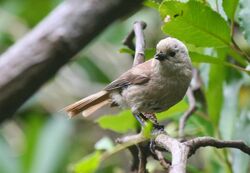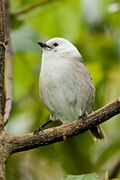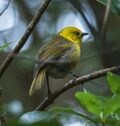Biology:Mohoua
| Mohoua | |
|---|---|

| |
| Whitehead (Mohoua albicilla) | |
| Scientific classification | |
| Domain: | Eukaryota |
| Kingdom: | Animalia |
| Phylum: | Chordata |
| Class: | Aves |
| Order: | Passeriformes |
| Infraorder: | Corvides |
| Family: | Mohouidae Mathews, 1946 |
| Genus: | Mohoua Lesson, 1837 |
| Type species | |
| Certhia heteroclites[1] = Muscicapa ochrocephala Quoy & Gaimard, 1830
| |
Mohoua is a small genus of three bird species endemic to New Zealand. The scientific name is taken from mohua – the Māori name for the yellowhead.[2] Their taxonomic placement has presented problems: They have typically been placed in the whistler family, Pachycephalidae, but in 2013 it was established that they are best placed in their own family, Mohouidae.[3] A large molecular genetic study published in 2019 found that the family is sister to the family Neosittidae containing the three sittellas.[4]
All three species display some degree of sexual dimorphism in terms of size, with the males being the larger of the two sexes.[5] Mohoua are gregarious (more so outside the breeding season) and usually forage in groups. They also forage in mixed species flocks at times, frequently forming the nucleus of such flocks.[2] Social organization and behaviour is well documented for all three Mohoua species; cooperative breeding has been observed in all three species and is common in the whitehead and yellowhead.[2] The three species of this genus are the sole hosts for the long-tailed cuckoo which acts as a brood parasite upon them, pushing their eggs out of the nest and laying a single one of its own in their place so that they take no part in incubation of their eggs or in raising their young.[5]
Taxonomy
The genus Mohoua was introduced in 1837 by the French naturalist René Lesson to accommodate a single species, the yellowhead, which is therefore the type species of the genus.[6][7]
Species
| Image | Scientific name | Common name | Distribution |
|---|---|---|---|
 |
Mohoua albicilla (Lesson, 1830) | Whitehead | North Island of New Zealand |
 |
Mohoua novaeseelandiae (Gmelin, 1789) | Pipipi or New Zealand brown creeper | South Island of New Zealand |
 |
Mohoua ochrocephala (Gmelin, 1789) | Yellowhead | South Island of New Zealand |
References
- ↑ "Mohouidae". The Trust for Avian Systematics. https://www.aviansystematics.org/4th-edition-checklist?viewfamilies=241.
- ↑ 2.0 2.1 2.2 "Handbook of Australian, New Zealand and Antarctic Birds"; Volume 7, edited by Peter Higgins, OUP, 2000
- ↑ Zachary Aidala et al. Phylogenetic relationships of the genus Mohoua, endemic hosts of New Zealand's obligate brood parasitic Long-tailed Cuckoo (Eudynamys taitensis). Journal of Ornithology, published online June, 2013; doi: 10.1007/s10336-013-0978-8
- ↑ Oliveros, C.H. (2019). "Earth history and the passerine superradiation". Proceedings of the National Academy of Sciences of the United States 116 (16): 7916–7925. doi:10.1073/pnas.1813206116. PMID 30936315. Bibcode: 2019PNAS..116.7916O.
- ↑ 5.0 5.1 Barrie Heather and Hugh Robertson, "The Field Guide to the Birds of New Zealand" (revised edition), Viking, 2005
- ↑ Lesson, René (1837) (in French). Histoire Naturelle Générale et Particulière des Mammifères et des Oiseaux Décoverts Depuis la Mort de Buffon. 9, Oiseaux. Paris: Pourrat Frères. p. 139. https://www.biodiversitylibrary.org/page/33058764.
- ↑ Mayr, Ernst; Cottrell, G. William, eds (1986). Check-List of Birds of the World. 11. Cambridge, Massachusetts: Museum of Comparative Zoology. p. 460. https://www.biodiversitylibrary.org/page/14484161. Note that Mayr gives the wrong title and date for Lesson's book.
- Del Hoyo, J.; Elliot, A. & Christie D. (editors). (2007). Handbook of the Birds of the World. Volume 12: Picathartes to Tits and Chickadees. Lynx Edicions. ISBN:978-84-96553-42-2
Wikidata ☰ Q1959514 entry
 |

